- Home
- Patricia MacLachlan
Edward's Eyes Page 2
Edward's Eyes Read online
Page 2
“I’ve seen fire and I’ve seen rain….”
“But I always thought that I’d see you again,” Albert sang with James Taylor. He smiled when he saw me on the stairs.
“Morning, Jake.”
“Morning.”
Light came through the screen, making crisscrosses on Albert’s face.
“Is it safe to go out now?” whispered Edward.
Albert shrugged.
“We’ll see,” he said, pushing open the screen door.
I could still hear Maeve, in the kitchen, singing along with James Taylor.
Weezer, closer than they think, shakes seawater all over Albert and Edward.
“Weezer! Dumb old boy!” shouts Albert.
Edward’s laughter mixes with my mother’s music. Always, always, when Maeve sings I hear Edward’s laughter. For the rest of my life.
Always.
“But I always thought that I’d see you again.”
Chapter 4
“Summer!” called Jack. He came up the hill with a box.
Sola and Wren hurried out of the water. Will left his window seat in the living room to come out to the porch.
“Books,” Will whispered. He grinned.
Summer always smelled like heat, the ocean, and the spines of old books.
Jack set the large box of books on the porch.
“My favorite!” I said, picking up a copy of Treasure Island.
“You read that last year,” said Will, digging through the box.
“I’ll read it again,” I said. “I’ll read it next year, too.”
“I know,” said Will, smiling.
Albert Groom sat on the steps, waiting for the next baseball game to begin.
“How to Pitch,” said Edward happily, holding up a book.
He handed the book to Albert.
“Ah,” said Albert. He opened the book.
“The knuckleball,” he said softly, so softly that everyone looked at him. “One of life’s mysteries. Think of it, the pitcher flips it toward home plate; it has no spin and you can’t hit it. I’ve always thought of the knuckleball as a kind of Zen experience,” he said.
Jack smiled and sat back.
“We live on a sphere which is spinning 1,000 miles per hour, in a galaxy which is spinning,” said Albert. “Our bodies are made of molecules whose electrons are all spinning and orbiting. And with all this, and a small flip of the fingers and wrist, a round ball is thrown with zero spin.”
He looked up suddenly.
“A mystery.”
“A mystery,” repeated Edward, staring at Albert.
Every summer Jack and Maeve took time off from the bookstore, hiring college students who read the summer away, room by room, from history to architecture to bee-keeping.
“They fall in love,” said Jack, “with Chekhov and Shakespeare and Margaret Wise Brown.”
“And with each other,” said Maeve, music following her as she came out of the house. “In the heat. Jack doesn’t believe in air-conditioning,” she told Albert.
“It’s unromantic,” said Jack, making Albert smile.
“Oh?” Maeve commented, her eyebrows raised. “Sweat is romantic?”
Jack and Maeve looked at each other and we’d roll our eyes and smirk, somehow knowing that they had fallen in love between the rows of books, too. Probably sweating, the two of them.
“Have you ever been in love?” Edward asked Albert.
“Edward, that’s private,” said Maeve.
Albert smiled. “That’s all right, Maeve.”
“Many times,” he said to Edward. “Sometimes, on the baseball field, I’d look over into the stands and a girl would be looking back at me. Sometimes, it was as if we were the only ones there, no one else around. Until a fly ball came, of course,” he added.
“That is very romantic, Albert,” said Maeve.
“So you never got married?” I asked.
“I was married to baseball,” said Albert.
“Me, too,” said Edward.
Everyone laughed.
Will found two more books at the bottom of the box.
“This is better than Christmas,” he said.
I picked up a book on the animals of Africa.
“Better than birthdays,” I said. “Better than most anything.”
And it was, rummaging around boxes of books, squirreling away books in our rooms, treasures waiting to be discovered and traded, read and reread.
In the summer Maeve tossed a flowered tablecloth over the television set, serving teas in the afternoons with little cucumber and watercress sandwiches with the crusts cut off, bowls of chocolates and jelly beans, mostly red, and cookies. There were black and green olives, and salads with strange names like endive and radicchio with raspberry and walnut dressing, and for all of us, cakes that were Maeve’s trademark. She was not a good cook, Maeve, but she made tea cakes with chocolate and marshmallow and almond cream icing topped with candied decorations. I don’t think they were baked. Wren once said that they had to harden out of boredom, standing around in the summer heat. They were sweet, though, so sweet that we had to eat them with glasses of ice water lined up in a row to wash away the sugar. Even Sola, the true sweet eater of the family, couldn’t eat more than one. After one “coma cake,” as Sola called it, she would stagger to the porch hammock strung between two white pillars.
“Don’t touch me,” she’d warn us, her arms over her eyes. “Don’t even speak to me. And do not swing the hammock. I’ll be sick.”
The rest of us, by that time, were so energized by sugar that we went outside to run around violently in the heat, sometimes playing soccer. Before the sun went down Maeve would come out to hit us baseballs with the fungo bat. We chased baseballs until by dusk we lay in exhausted heaps.
Out over the water there was an orange full moon above, a watery one below. Edward put his head on my shoulder, and the air was still. Then, one by one by one, the lightning bugs came out.
“Are you asleep, Edward?” I whispered.
“Yes, I am,” said Edward, making me laugh.
Sometimes Maeve and Jack would lead us off to bed. But most times, if there wasn’t rain coming, they would toss blankets over us and we’d sleep outside, Edward’s head on my shoulder, his sweet-smelling breath soft on my neck.
Chapter 5
“What are you doing?” I asked.
Wren, Will and Edward were behind the barn, Wren hunkered down behind a home plate bag, Will sitting to the side reading aloud, Edward pitching.
Will looked at me for a moment as he read.
“The ball should be held as shown…clenching the ball with your bent fingers….”
He got up and went over, showing a picture to Edward.
Edward nodded.
“I’m learning to throw a new pitch,” said Edward. “I’m going to surprise Albert Groom on his birthday.”
I smiled. Edward often used Albert’s whole name. It was as if Edward liked to say it. Albert Groom.
“What pitch?” I asked. Edward tried all things. Even a new pitch.
“You’ll see,” said Edward. “Ready?” he called to Wren.
Wren grinned.
“It’s only a Wiffle ball, Edward. You’re not going to hurt me.”
Edward threw a slow-looking, loopy pitch.
Wren caught it and stood.
“That’s very odd, Edward,” she said.
“What do you mean?”
“No spin,” she said. “No spin at all. And it dipped.”
Edward smiled.
“It says here in this book,” said Will, “that Annabelle Lefty Lee once threw a perfect game when she played in the women’s league. She threw a knuckleball. It says here that if it works batters can’t hit it. If it doesn’t even the pitcher doesn’t know where it’s going.”
“Risky,” said Edward. “I like that.”
“Not afraid of anything,” Wren said to me.
“It doesn’t look very hard to hit,”
I said. “It looks slow and easy.”
Edward looked at me.
“Come on, Jake.” He beckoned. “You try.”
I shook my head.
“I’m not a good hitter,” I said.
“Doesn’t matter,” said Edward with a grin. “You won’t hit this anyway. No one can. Come on,” he repeated.
I picked up the bat and stood in the batter’s box.
“You’re going to love this,” said Edward.
He threw the ball. It seemed to come slowly, and I cocked the bat and swung. And missed.
Will laughed.
“Doesn’t look too hard to hit,” he said.
“Don’t mock me,” I said. “Throw it again, Edward.”
He threw.
“Strike two,” he said as I swung and missed.
“Strike three.”
“Strike four.”
“Strike five.”
Wren and Will fell over laughing at me.
“Albert Groom is going to be very surprised,” said Edward.
It rained for a week, so there were no baseball games. But that didn’t stop Edward. He practiced his new pitch every day, no umbrella. He begged Will, Wren and me to practice with him. And we did. Sola refused. He threw Wiffle balls at first, and then he went to a tennis ball. Finally, in the drizzle of late June, Wren’s hair all curly from the humidity, we stood behind the barn, and Edward threw his first baseball knuckleball to Wren.
I stand behind the plate and watch. It is almost as if it happens in slow motion, this ball coming so slowly that we seem to wait forever for it. I can even see the stitching on the ball. And then it darts past Wren. Past me.
Will didn’t say anything. Wren didn’t say anything. I just looked at Edward and smiled. He smiled back.
“Right behind you, Annabelle Lefty Lee,” he said.
Finally the rain ended. Jack and Maeve joined Albert Groom and me on the porch to watch the game. The sky was overcast, clouds moving in over the water.
“Rain again, maybe,” said Jack.
“I hope not,” I said. “Edward has a surprise.”
Albert’s hand rested on Weezer.
“What kind of surprise?” Albert asked.
“The best,” I said.
Albert turned to look at me.
“The best?” said Albert, smiling. “What can that be, Weezer?” Weezer thumped his tail against the porch floor. Mavis came with her blankie. Mary Brigid came wearing a dress.
“I have to go to a party after the game,” she complained.
“Very nice,” said Maeve.
“Sort of lends a formal quality,” said Albert Groom. Wayne, Billy Bob, Lukie, and Morris, Brendan and Caitlin came.
Weezer whined.
“All right,” said Albert. “Go out there.”
Weezer loped out to center field, turned and sat. Mavis and Joe laughed. The sun broke through, and Trick came up the side lawn.
“Have a seat, Trick,” said Jack.
“I will,” said Trick. “Weezer playing?”
“Very funny,” said Albert.
Trick winked at me.
“Play ball,” yelled Trick.
Edward smiled at him, then at Albert, and at me. He walked to the pitcher’s mound.
I heard Albert take a breath. “Edward’s pitching? He’s not a pitcher.”
Wren came to sit on the steps, Will next to her. Even Sola came out on the porch and leaned against the wall.
The game began in sunlight.
Edward threw his first pitch.
“Hey!” called Mary Brigid. “What was that?”
Albert sat up straight and peered at Edward.
“Hey,” called Trick, imitating Mary Brigid, “that was a knuckleball!”
“When did this happen?” whispered Albert.
“All through the week of rain,” I told him. “He practiced every day.”
“A knuckleball is almost impossible to catch,” said Wren. “But I got pretty good at it. Even in the rain.”
Albert smiled at her.
“Good for you.”
Edward threw two more knuckleballs. Three strikes. Mary Brigid was out.
Wayne, Billy Bob and Mavis were out, too. And Mary Brigid again.
Finally Wayne, frustrated, threw his bat at the ball, surprisingly hitting it into the outfield. Weezer grabbed the ball and ran down to the water, prancing along the edges of the water.
Edward walked over to the porch.
“I learned to do it,” he told Albert, “but it’s still a mystery.”
“Yes,” said Albert, beaming.
“Happy birthday, Albert Groom,” Edward said.
Chapter 6
It happened on the Fourth of July. How was it we didn’t notice? All the signs were there. At least Sola said so later, and she had been through this many times. But we were surprised. Even Sola.
It was cool for July. As the sun went down we all sat out on the front lawn, our bellies full of hamburgers, hot dogs and cake. Albert Groom and Trick, Maeve and Jack sat in chairs; the rest of us wrapped in blankets. Above, the fireworks bloomed over the water; sparkling dandelions in the sky and in the water below.
“I wish we could have fireworks every day,” said Edward, curled up between Sola and me.
“That would be superfluous,” said Sola. She turned to Edward. “One of the few vocabulary words I remember.”
Edward smiled. I could see his white teeth in the dark.
“Fireworks are never superfluous,” he said. “We should have them at every event.”
He began to list firework events.
“Deaths, birthdays, end of school, beginning of school, first case of poison ivy, first knuckleball thrown…”
“Beginning a book,” continued Will.
“Finishing a book,” said Jack, laughing.
“Reading a book again,” I said.
“New boyfriend,” said Sola, making us laugh.
“A perfect baseball game,” said Trick.
“Any baseball game,” said Albert.
There was a sudden silence between fireworks.
“Birth, you forgot,” said Maeve, her voice suddenly strange and soft in the silence, a faraway sound to it.
We turned our heads to look at her. Even Albert stared. Then, he reached out and took Maeve’s hand. He smiled at her.
“What?” said Will.
“Isn’t that nice,” said Albert.
“What? What is nice?” demanded Wren.
Sola sighed. She pulled the blanket over her head.
“A new baby,” she said under the blanket. “Yet…Another…Baby.” She spaced out the words as if she were making a pronouncement.
“No,” I said. “No.”
“It’s true,” said Maeve. “Remember how you loved Edward the moment he came home, Jake?”
“That’s different,” I said loudly. “That was Edward!”
“Wait!” said Edward, sitting up. “Can we have fireworks when she is born?”
“She?” said Sola.
“Yes,” said Edward with a great smile. “It will be a girl. Can we name her Sabine?”
“French,” said Trick.
“She’ll be Sabine. And we’ll have fireworks!” said Edward.
Now it was everyone’s turn to stare at Edward. There was, in his voice, the feel of sunlight, even though it was dark.
And then, a great shooting fireworks went up and filled the sky, sparks falling down to the water like bright rain.
“Fireworks, remember,” Edward said to Maeve.
Chapter 7
“What is Trick doing?” asked Edward.
Edward, Albert and I were in the rowboat, handheld fishing lines dropped over the sides. The water was still. The sky was summer blue, with two high white clouds. Edward pointed to the shore with his chin. Trick sat on a rock, staring out over the water.
“Looking for signs,” said Albert. “Trick looks for signs all the time. Most times he finds them.”
&nb
sp; “What do you mean, signs?” I asked.
“Things happen to point you in one direction or another,” said Albert. “You just have to look for them.”
“Signs,” said Edward, thoughtfully.
“Well, there were no signs Maeve was going to have a baby,” I said.
“Sabine,” corrected Edward.
Albert smiled.
“Whatever,” I said. “At least we weren’t paying attention to signs.”
“Well, Trick does,” said Albert.
Edward bobbed his fishing line up and down. He looked at Trick.
Suddenly, Edward handed me his fishing line and stood up, rocking the rowboat a little.
“Edward!” I said, holding on to the gunwales of the boat.
Edward stripped off his shirt and pants until he stood in his shorts. His eyes were the color of the sky.
“What are you doing?”
“I’m giving Trick a sign!”
And Edward dove a perfect dive, slipping quietly into the water, rocking the boat a little as he went. Trick watched as Edward swam across the inlet. His strokes were smooth and steady, and Trick watched him as he came to the shore.
“He can do anything, Edward,” I said softly.
Beside me Albert bobbed his fishing line up and down.
“Seems so,” he said. “That’s because Edward tries to do everything. He doesn’t care if it doesn’t work.”
“You mean fail?” I asked.
Albert smiled.
“I don’t think Edward thinks of it as failure. He thinks of it as not working when it doesn’t. What he does doesn’t define him.”
“Well, what does?” I asked.
“The trying of it,” said Albert.
“Who is he?” I said very softly.
It wasn’t a question, and Albert didn’t take it as one. He kept bobbing his fishing line up and down. A small cloud tried to cover the sun, and there was a moment of quiet coolness. A sign?
“He’s going somewhere,” said Albert. “Somewhere he knows, or maybe doesn’t. But he’s going somewhere.”
The cloud passed. The sun came out. And Edward sat down on a rock next to Trick.

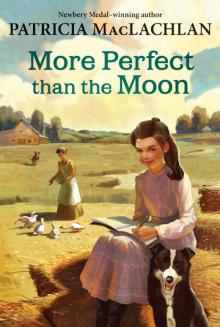 More Perfect Than the Moon
More Perfect Than the Moon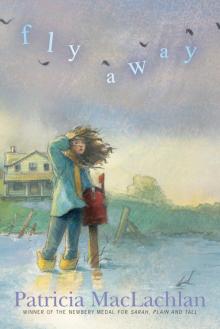 Fly Away
Fly Away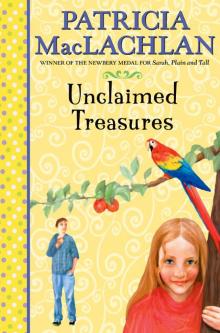 Unclaimed Treasures
Unclaimed Treasures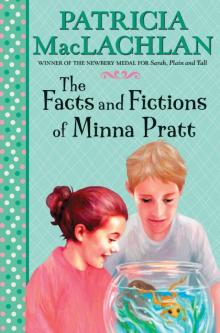 The Facts and Fictions of Minna Pratt
The Facts and Fictions of Minna Pratt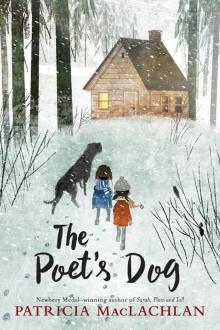 The Poet's Dog
The Poet's Dog Journey
Journey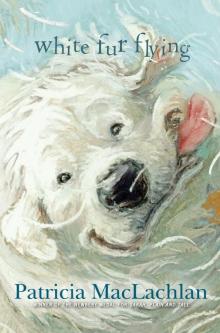 White Fur Flying
White Fur Flying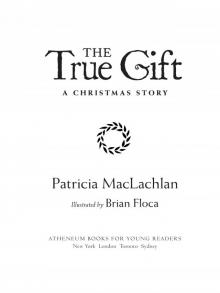 The True Gift: A Christmas Story
The True Gift: A Christmas Story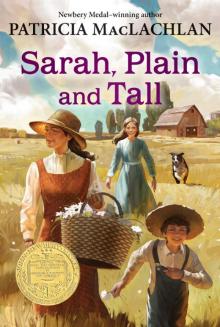 Sarah, Plain and Tall
Sarah, Plain and Tall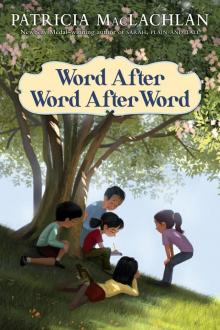 Word After Word After Word
Word After Word After Word Seven Kisses in a Row
Seven Kisses in a Row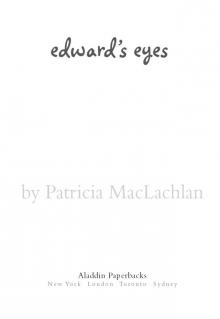 Edward's Eyes
Edward's Eyes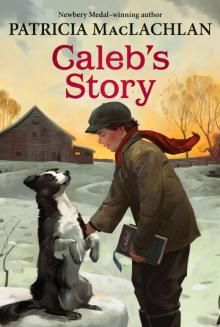 Caleb's Story
Caleb's Story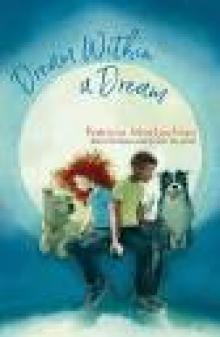 Dream Within a Dream
Dream Within a Dream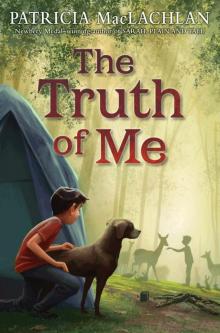 The Truth of Me
The Truth of Me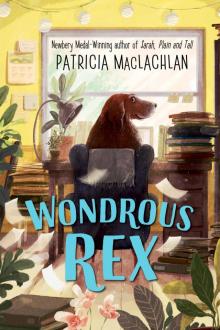 Wondrous Rex
Wondrous Rex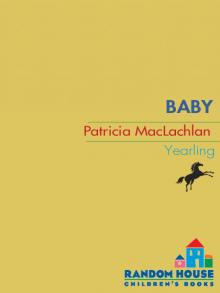 Baby
Baby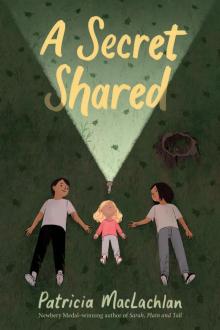 A Secret Shared
A Secret Shared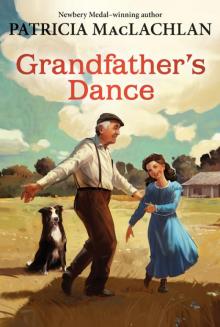 Grandfather's Dance
Grandfather's Dance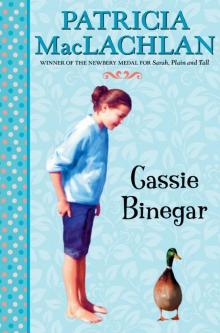 Cassie Binegar
Cassie Binegar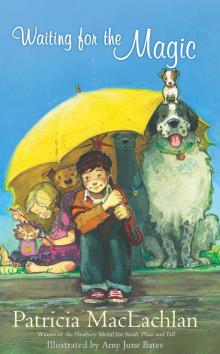 Waiting for the Magic
Waiting for the Magic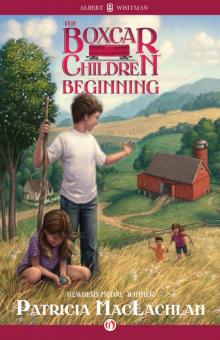 The Boxcar Children Beginning
The Boxcar Children Beginning My Father's Words
My Father's Words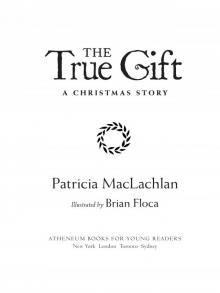 The True Gift
The True Gift